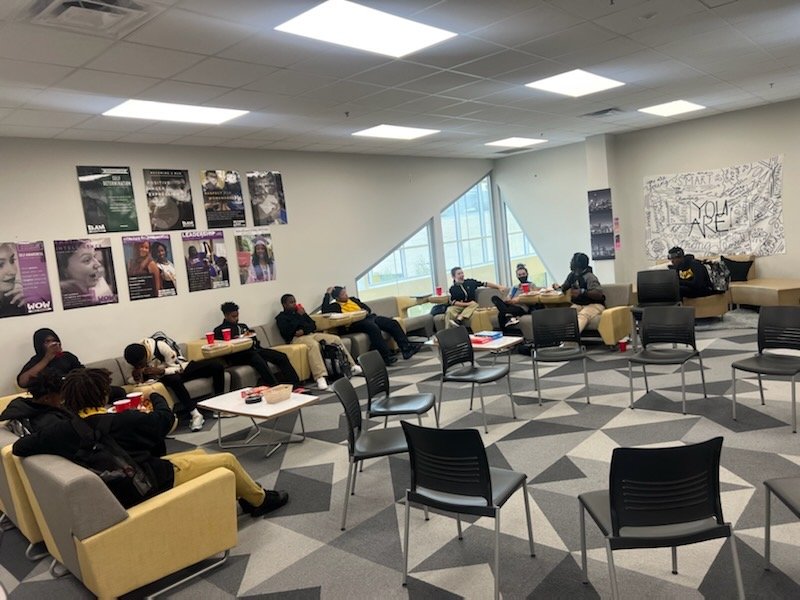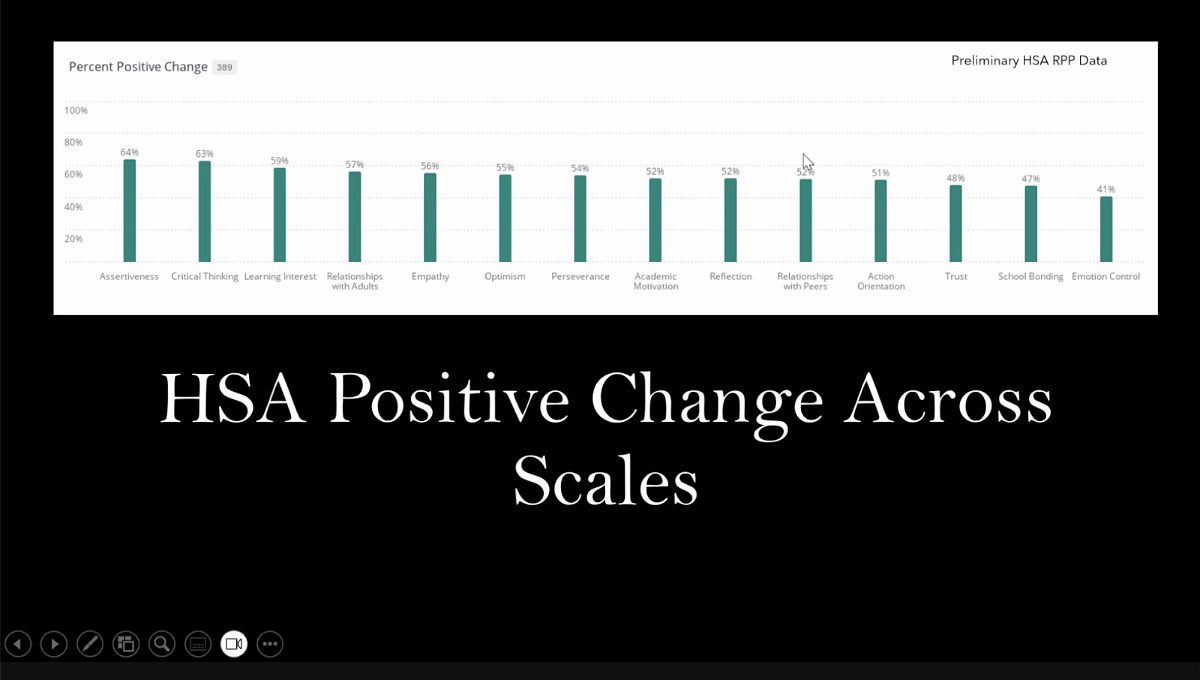On a typical day at L.G. Pinkston High School, as students file into classrooms, some make their way to a tucked-in corner room on the building’s second floor. Here, a different type of learning happens, in a more relaxed environment with comfortable chairs and soft lighting.
This space is home to Pinkston’s Becoming a Man (BAM) and Working on Womanhood (WOW) groups. At any given time during the school day, students can be found participating in these Youth Guidance weekly group sessions. They can also drop in for a one-on-one talk, or use the space to play games, color, and just take a break.

Sophomore Christian Williams joined the program earlier this year. He says BAM connected him with a male mentor as he’s struggled with his relationship with his dad. The program, he says, allowed him to deepen respect for himself and others. He cautions that any students who join should prepare themselves for emotional conversations.
“Prepare yourself to cry once or twice, because Mr. Travis and Ms. Jenae give lessons like no one’s business, because you’ll realize that their story is relatable to you,” Williams says. “I would say for anyone who wants to join BAM or WOW, you should do it, because it’s going to help you out in the long run.”
Mr. Travis and Ms. Jenae are Travis Mason and Jenae Johnson, the school’s BAM and WOW specialists, who can be found in Youth Guidance’s second-floor space on campus every school day.
Both programs serve seventh- through 12th-grade students, offering mentoring and counseling programs based on cognitive behavioral therapy and trauma-informed approaches. These tactics improve students’ attendance and grades, in addition to overall well being, but they also have a critical byproduct — they prevent and reduce violent crime.
What may seem like small, personal accomplishments for teenagers can have a collective impact on public safety. At least, that’s why Mayor Eric Johnson’s Task Force on Safe Communities recommended these programs to Dallas ISD in fall 2021. Implementing Youth Guidance was one of the task force’s four researched suggestions to address 2019’s 15.1% increase in Dallas violent crime.
“Situational awareness is a big deal. Kids’ ability to stop and see the situation can stop an awful lot of things from escalating,” says Alan Cohen, executive director of Child Poverty Action Lab and appointee to the mayor’s task force. “The original researchers realized there was a link between BAM and violence. They looked at kids in juvenile detention or behind bars, they listened to and looked at court records, and they saw that these are good kids but for one decision, but for 20 seconds they wished they could have back.”
As of Dec. 6, according to data from the Dallas Police Department, 421 arrests have been made for violent crime by perpetrators younger than 19 in the past two years. The task force’s report emphasized that providing programs like BAM and WOW can teach social-emotional skills and strategies that “may be life-saving.”
“In the neighborhood I grew up in, if I acted before I thought, we’re talking about a potential shoving match and Saturday detention,” Cohen says. “In a neighborhood where gun violence is a factor, it’s a life or death situation.”
A team of researchers in Chicago studied the BAM program for more than a decade and found that participating students were 50% less likely to be arrested for violent crime, and 19% more likely to graduate on time.
BAM and WOW programs now exist across the country in seven major cities, serving approximately 13,000 students per year.
WOW’s prevention tactics center not on violence but on depression and anxiety. The Center for Disease Control reported in February 2023 that 60% of adolescent girls reported experiencing “persistent feelings of sadness or hopelessness” in the past year. WOW has seen that 71% of their clinically depressed female students had fewer symptoms, and 62% of their students with clinical post traumatic stress disorder had fewer symptoms.
The twin programs are available at five Dallas ISD high schools: David W. Carter, North Dallas, W.W. Samuell, Skyline and Pinkston.
Shereta Redmond, a licensed clinical social worker who oversees the Pinkston, Skyline and Samuell programs, says studies have shown that young people benefit substantially from having mentors outside of family and school staff.
“Sometimes these are the students who tend to fall through the cracks. They’re not having outward behavioral challenges. They’re getting decent grades, but they’re not connected,” Redmond says. “They may have some social anxiety and other challenges that they’re dealing with that keeps them from being actively engaged in school. This is a space where they can really flourish.”
Youth Guidance’s Dallas executive director, Michael Berry, a Dallas native, says he took on the role managing the implementation of the programs because of his own struggles with mental health. While he was working through the curriculum, he found himself deeply connected to the lessons of the program.
“[Before this] I had a really rough work experience that put me down a tough path, which had me second guessing myself. I began to think about imposter syndrome, I began to have bouts of anxiety and panic attacks,” Berry says. “These values of emotional intelligence, as well as maturity, respectful womanhood, accountability, integrity, visionary goals are things that everybody would want to be a part of and want to strengthen.”
Now in their third year at Pinkston, the programs have continued to grow, currently serving about 140 Pinkston students, as BAM and WOW each have five groups of about 10 to 15 students. Though Johnson and Mason recruit students at the start of the school year, and receive recommendations from staff, the program is entirely voluntary. Group sign-ups take place at the beginning of the school year, but all students can utilize the space or meet with the specialists. Mason says their openness and listening ear for all students is what has allowed the Pinkston programs to succeed.
“It’s just giving them the opportunity just to say, ‘Hey, I’m having a bad day, Mr. Travis. I just need you just to sit and listen,’ ” Mason says.
Youth Guidance hopes to expand into more Dallas ISD schools each year, but because the physical space is a key part of the program — both to host sessions and allow BAM and WOW specialists to remain on-site all day — expansion can be difficult.
Johnson, now in her second year at Pinkston, says that her interest and motivation to work with students come from the mentorship she received in high school.
“[My school counselor] really poured into me, and it’s cliche but I was like, ‘I want to be like her when I grow up,” Johnson says. “I understand high school is just such a pivotal point for people’s lives; that’s truly where they’re exploring themselves trying to figure things out.”
In Dallas, Berry and his staff use the holistic student assessment (HSA) to track social and emotional development across areas such as critical thinking, school engagement and resiliency. Students complete this assessment when they begin the program, to allow staff to identify where students need help, and again at the end of program, to track growth. Following their time in BAM or WOW, Dallas ISD students saw improvement in every one of the 14 categories measured.

Williams says BAM has helped him find opportunities to grow and improve himself outside of the classroom. While the occasional perk of a T-shirt or playing a game is fun, he says building better relationships with his peers, family and self has been the best part of the program.
“I had an emotional rollercoaster for the first time in BAM, when I realized other men could relate to me,” Williams says. “You get brotherhood, or you get sisterhood … Travis and Jenae provide this space where you can relate to them, they listen, which is the best thing they can do, and they teach me so much.”
Correction: The original piece stated the BAM and WOW programs would be expanding into Lincoln, Franklin D. Roosevelt and Kimball high schools this year. While that is the hope of Youth Guidance, these plans did not pan out.

We need to start these emotional support programs with quality early childcare . These kids need emotional support from the day they are born.